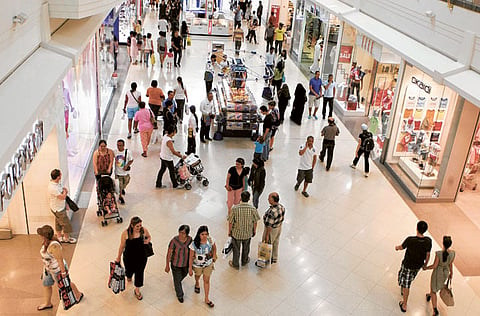UAE consumers ease back into spending mode
Intelligence unit predicts a decade of growth

Dubai: With the local economy beginning to show signs of recovery, consumers are slowly returning to their spending habits and expenditure in the UAE will again pick up in the next few years, reaching Dh627.8 billion in 2020, Euromonitor International told Gulf News.
The provider of global business intelligence projected that between 2010 and 2020, consumer spending will grow at a "healthy but less-than-robust" compound annual growth rate (CAGR) of nearly five per cent.
"Part of this growth, at least in the short term, will be the result of UAE consumers releasing pent-up demand accumulated during the recession and slowly returning, albeit with less gusto, to their buying ways. For the most part, while expenditure is projected to grow over the forecast period, it will do so at more subdued rates," a Euromonitor spokesperson told Gulf News.
Over the forecast period, a huge portion of consumers' money will go to hotels and catering, where expenditures will rise to Dh76.3 billion in 2020, posting a robust growth of 88 per cent.
More consumers will find time to relax, unwind and enjoy their free time over the same period, with spending on leisure and recreation expected to grow by 68.4 per cent, reaching more than Dh23 billion in 2020.
At the same time, expenditure on health goods and medical services will expand by 76.5 per cent, hitting Dh16 billion, while the amount of money spent on clothing and footwear will increase by 54 per cent to Dh37 billion.
Although there's a general decline in accommodation costs, housing expenditure is seen to expand by 58.9 per cent to Dh230 billion, accounting for the largest proportion of consumer spending.
Consumer spending is a major component in the gross domestic product (GDP). The International Monetary Fund earlier this month updated its 2010 GDP growth forecast for the UAE to 2.4 per cent, from 1.3 per cent in May. Economic recovery is also expected to strengthen elsewhere in the Middle East, owing to the rebound in oil and other commodity prices, as well as governments' fiscal expansion policies.
Signs of sabilisation
"Economic growth has started to build up with expected GDP growths of two per cent in 2010 and four per cent in 2011. Early signs of stabilisation are showing as money market rates start to drop and there is lesser volatility on fund movements. There is also slow growth starting to be seen on the mass retail and the SME business front," noted Shekhar Krishnamurthy, head of retail assets and liabilities, Emirates NBD.
Krishnamurthy said there are several factors aiding consumers to pull through slowly and these include falling costs of living, building of economic growth and stabilizing of employment. "Affinity to fast growing markets in the GCC and Asia are also having a rub-off effect," he said.
Another factor affecting consumption is the improving consumer confidence level. Rasool Hujair, CEO of Majid Al Futtaim (Maf) Finance, said their customers are now using their credit cards twice as much as they did a year ago. "In my opinion, this reflects the significant increase in consumer confidence," Hujair told Gulf News. Maf Finance is the issuer of Najm Visa and Najm JCB credit cards.
Hujair said UAE consumers are spending most of their money in hypermarkets and supermarkets, which account for 50. 2 per cent of the total expenditure. Fashion and travel spending come in next, at 6.7 per cent and 4.6 per cent respectively.
"The data we have show that shoppers place food, education, health and utilities far higher than so-called luxury items, such was watches and shoes. Such luxury goods (accounted for) only 6.2 per cent of total spending, which could be seen as indicative of how the recession has affected shopping habits," he added.



